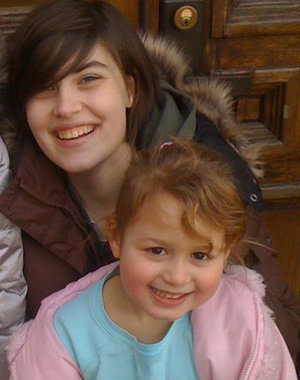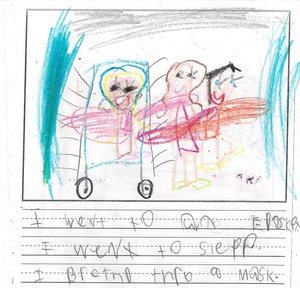Family Story: Jennifer North, NFCA and her Sister, Rebecca Weisberg
A Grand Tasting Adventure
My sister and I think about gluten-free food all the time. Even though we’ve known each other intimately for over 38 years, we now share something new. We both have daughters with celiac disease.

My daughter Molly (back) and my
niece Temira (front)
As the Vice President of the National Foundation for Celiac Awareness (NFCA), I am blessed with access to a wealth of gluten-free resources and information at my finger tips 24/7 – and I am passionate about sharing it. Luckily, my family has listened and my sister, Becca, was able to secure a diagnosis for my niece Temira as the disease process was onsetting. That’s pretty phenomenal. Especially given that she was about to give birth and was distracted by her own health concerns.
I’ve asked Becca to share her story in the hope that others will become empowered to talk to their family members about being tested. I also think Becca’s story is interesting because she and Temira have turned the transition to the gluten-free diet into a “grand tasting adventure.”
– Jennifer North, NFCA
Becca and Temira’s Story
My go-for-the-gusto five year old daughter Temira always draws herself with a huge smile on her face, so a recent picture she brought home did not seem out of the ordinary – until I noticed that she was lying on a gurney in the picture. She had drawn a picture of herself at the hospital for her endoscopy to diagnose celiac disease.
We had been monitoring Temira since age two, when family history and mild symptoms led us to screen her for celiac early on. While that first test was negative, it revealed an important detail: Temira had both HLA-DQ2 and HLA-DQ8, the genes associated with the disease. Her chances of developing it were 14% higher than the general population (it’s estimated that 40% of the population has at least one of the genes, but it’s much more rare to have both). Our doctor at the time recommended re-testing every three years unless her symptoms became more pronounced.
Fast forward to last summer, when three years had passed and Temira had increasingly been complaining of stomachaches. Over the next few months, the story became a frustrating comedy of errors, with a new doctor completely misreading and misreporting test results, trips back and forth between top doctors in New York and Philadelphia to understand the correct lab records, and bloodwork re-done twice to confirm again. (Oh, and let’s not forget our newborn baby who arrived the day after Hurricane Sandy to a house with no power for eight days, right in the middle of this process! An eventful autumn to say the least.)

Five year old Temira drew this after her
celiac diagnosis. It reads, “I went to an
endoscopy. I went to sleep. I breathed
through a mask.”
But I digress. I’m sure readers are more interested in the final outcome. It turned out that Temira’s bloodwork was erratic because her celiac was in the process of developing and an endoscopy early on might not have been conclusive. We increased her gluten intake to try to clarify the effect, and the biopsy did confirm celiac in February of 2013. I was worried at first about Temira’s emotional reaction – she loves to eat, especially sweets, and it had a been a transition year in our house due to a variety of family changes. But she has kept that giant smile throughout the process, with only a few tears in between. Despite the challenges, Temira’s amazing attitude has transformed the journey into a grand tasting adventure, a constant hunt for gluten-free edible treasures.
Our experience is not typical. We were comparatively informed; not only does Temira’s first cousin, Molly, have celiac disease, but her Aunt Jennifer also works for NFCA. So we had constant suggestions along the way and instant access to a great deal of research. We were able to identify Temira’s celiac at its first onset, rather than waiting the normal nine year average for diagnosis.
But with some basic tools, everyone can have access to this kind of information and support. I hope that people with family history will take these lessons from our experience:
- Take your family history seriously – determine your genetic predisposition and screen regularly. Since many people with celiac disease don’t have any symptoms at all, you can’t assume that you will know if you or your children have developed it.
- Ask, ask and ask again. A surprising number of specialists are not as well informed as they should be, and are not as proactive as you might like. Ask your doctor or pediatrician to order the genetic test for celiac. Make sure your celiac panel is complete for all the antibodies. Get second opinions. If you have symptoms but the bloodwork is negative, ask if the endoscopy is recommended. If you are uncertain about your doctor, look for a new one!
- If you have a family history of celiac, and you have children with genetic predisposition to celiac, engage them in learning about celiac and a gluten-free lifestyle at an early age. Even if they never develop it, their understanding will increase their sensitivity to their relatives’ experience – and if they do develop celiac, their transition will be much easier. Temira’s familiarity with her cousin Molly’s diet and lifestyle helped us all a great deal.
With gratitude to NFCA,
Rebecca Fried Weisberg and the Weisberg Family


